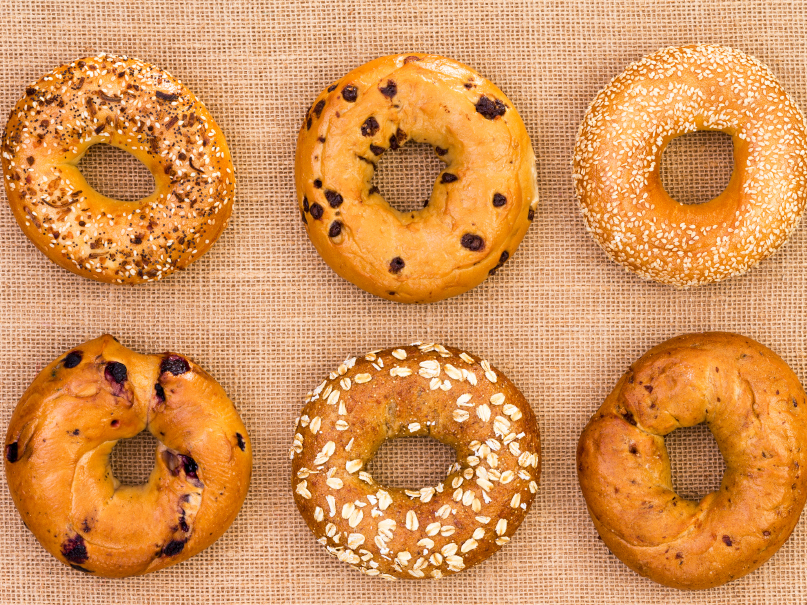
(H) A Bagel Is More Humorous song for TTBB Chorus of Bagel Lovers and Piano. Lyrics by Richard Marcus from the Metropolitan Diary of The New York Times, March 21, 1991. Also available for SATB and solo voice.
View the poem and the score and laugh. Listen to midi.
A bagel is more than a Jewish doughnut.
More than a roll with a hole.
More than a strange English muffin.
A bagel's got bagelly soul. . . .
So the next time you feel
That your life is the pits,
And you're trapped in the grind and the crunch.
Stagger right in to the closest warm bagelry,
And take a nice bagel to lunch.
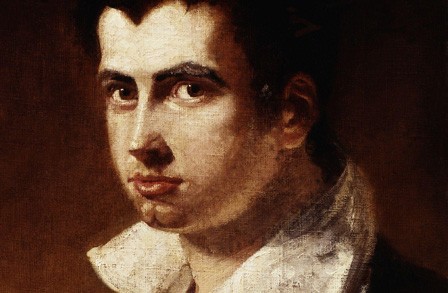
Abou Ben Adhem TTBB or SATB chorus and piano. Poem by Leigh Hunt (1784-1859) (3 min.)
Leigh Hunt was an English poet and essayist. His poem Abou Ben Adhem is a prime example of Romantic Orientalism and is noted for its non-stereotypical depiction of an Arab, showing a liberal attitude for its time. The work is dedicated to the University Glee Club of New York in memory of Bailey Harvey (1906-1991). my mentor.
View the poem and score. Listen to midi.
Abou Ben Adhem awoke one night from a deep dream of peace,
And saw in his room An angel writing in a book of gold . . . .
The angel wrote, and vanished. The next night
It came again with a great awakening light,
And showed the names whom love of God had blest,
And lo! Ben Adhem's name led all the rest.
Alone/Together TTBB chorus, tenor or alto solo and piano. Text by Jason Charnesky (4 min.) Yelton Rhodes YR4905
Commission and Premiere: Harrisburg Men's Chorus for 10th Anniversary Concert, December 1997.
Lyric pop/jazz anthem with inspiring text by Jason Charnesky. Great showpiece for the favorite belter friend of the choir, male or female or trans.
View the score sample. Listen to midi.
Harvest Due Secular anthem for TTBB optional solo voice and piano.
The lead anthem from the 1976 Bicentennial Wagon Train Show,. with lyrics by Roger Cornish (1934-2000).
On the recording the solo is sung magnificently by perhaps the finest baritone soloist ever in the Penn State Glee Club, Doug Smith (1950-2002).
Listen and view TTBB score and words. Download TTBB score.
Midnight Walk TB Chorus and Piano. Lyrics by Jason Charnesky. 1997 (2 minutes)
Ecstatic poem about finding oneself in solitude and then returning to one’s fellows, set to Elgarian modal melody and Berliozian rapturous harmonies and accompaniment. Perfect for the young male singers pondering life - its meaning and purpose.
Written for Peggy Horner and her choirs at Keith Junior High School in Altoona, PA.
View lyrics and score. Listen to midi.
Music and Song TTBB Chorus and Piano Text from the 1897 La Vie, the Pennsylvania State College Yearbook.
For high school, collegiate or community male choral ensembles.
A boisterous setting of a very silly and yet erudite text about collegiate singing, referencing Gregorian Chant, drinking songs, love ballads, and all the other genres of musical conviviality.
View lyrics and score. Listen to midi.
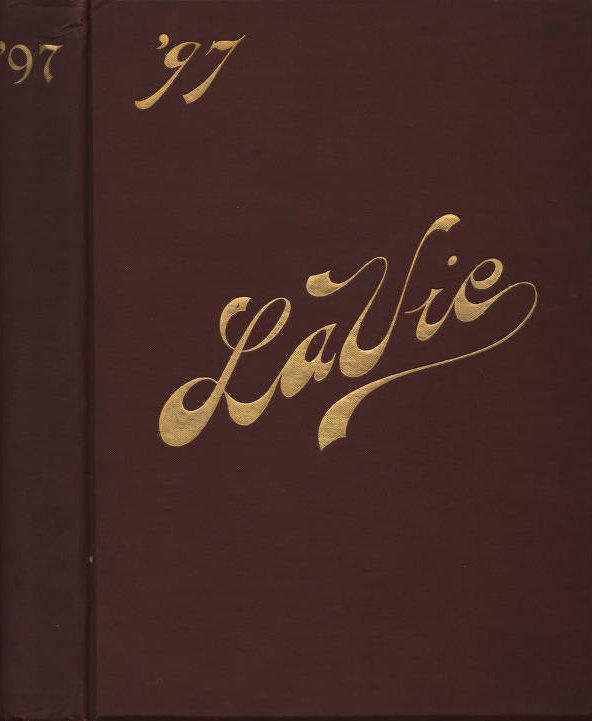
They'll sing or chant, this motley crew,
All measures they will employ;
They're skilled in two-four, three-four time,
Seven-eight they most enjoy.
With guitars, banjos, mandolins,
They seek to make a hit.
Their proceeds all they lay aside
For the “Glee Club’s benefit.”
Orpheus with His Lute For TBB and piano. Poem by William Shakespeare (1564-1616).
View, listen and purchase from Hinshaw 1656
Also available in SAB (HMC1657).
Commission: Phi Mu Alpha for the Penn State chapter’s 75th Anniversary. 1997.
Hinshaw says: Trinkley’s lovely lyrical setting captures the eloquence and drama of the famous Shakespeare poem. The piece requires skilled singers and a proficient accompanist as the piano part is quite challenging..
View sample pages. Listen to the Penn State Glee Club.

And the mountain tops that freeze
Bow themselves when he did sing:
To his music plants and flowers
Ever sprung; as sun and showers
There had made a lasting spring.
Every thing that heard him play,
Even the billows of the sea,
Hung their heads and then lay by.
In sweet music is such art,
Killing care and grief of heart Fall asleep, or hearing, die.
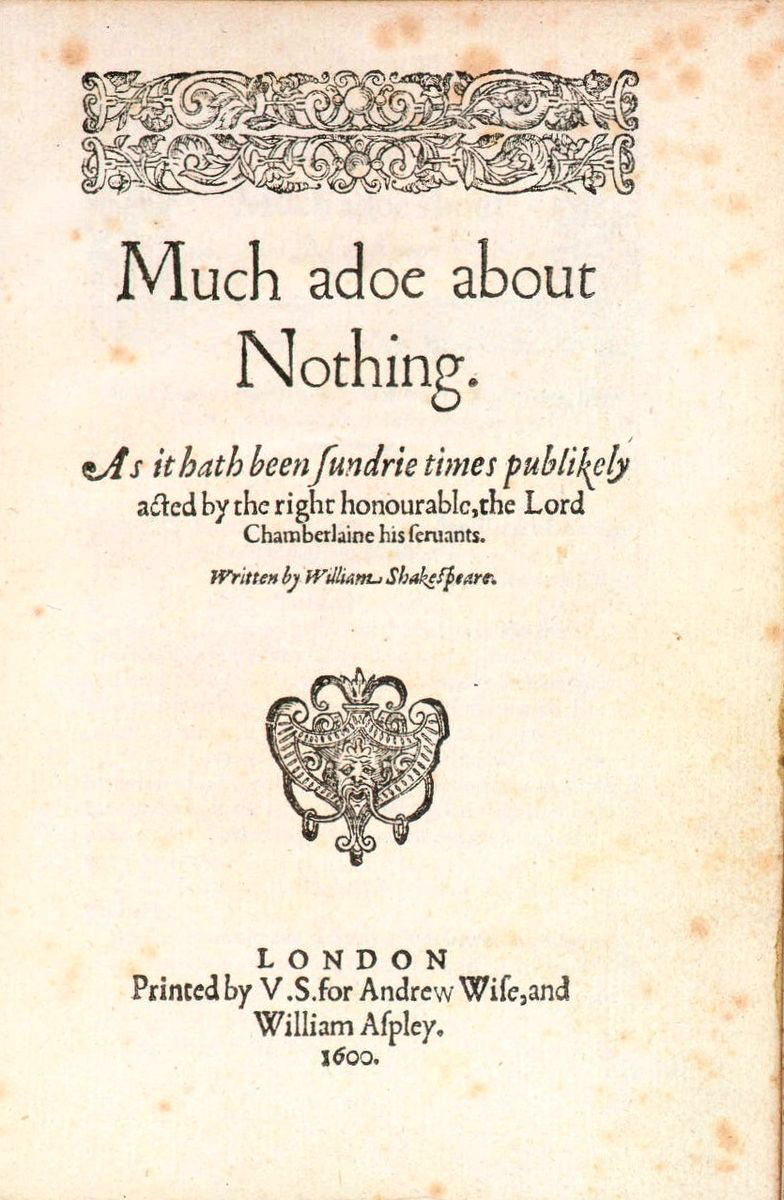
The next two Shakespeare choruses may be performed together: they are both from the same play but express contrasting moods and emotions.
Pardon Goddess of the Night TTBB chorus and piano.
Poem by William Shakespeare (1564-1616) from Much Ado About Nothing (1598/1599). (3 min.)
Premiere: Penn State Glee Club, April 1999
Hero has supposedly died and the men’s chorus mourn her passing in this elegy, one of Shakespeare’s most powerful laments.
View score. Listen to midi.
Those that slew thy virgin knight;
For the which, with songs of woe,
Round about her tomb they go.
Midnight, assist our moan;
Help us to sigh and groan,
Heavily, heavily:
Graves, yawn, and yield your dead,
Till death be uttered, Heavily, heavily.
Sigh No More Ladies TBB chorus and piano.
Poem by William Shakespeare (1564-1616) from Much Ado About Nothing (1598/1599). (2 min.)
Premiere: Penn State Glee Club, April 1999.
The song is sung by Balthazar to entertain his master, Don Pedro. But the underlying message is that women should not take men too seriously: they are not to be believed or trusted.
View score. Listen to midi.
Men were deceivers ever;
One foot in sea and one on shore,
To one thing constant never;
Then sigh not so,
But let them go,
And be you blithe and bonny;
Converting all your sounds of woe
Into. Hey nonny, nonny.
The Singer Lyrical elegy for TTBB and piano. (2:00) Also available for solo voice and piano. Yelton Rhodes YR4901
Poem by John Addington Symonds (1840-1893). Bruce has dedicated the song to the memory of singers we have lost to COVID during the pandemic.
View score sample. Listen to midi.
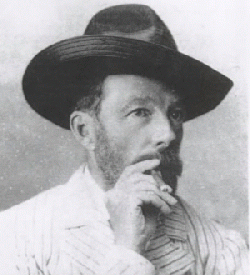
High notes of the heavenly morn
Forever and ever ringing
As age after age is born.
Then he is still, and we know not
Whither his thoughts have fled;
Only the clear notes flow not,
And we say, the singer is dead.
But the nightingales that he cherished,
They carol and cannot die;
Though the man whom we loved has perished,
His melody lives for aye.
I am not sure how I came to discover the wonderfully idiosyncratic texts of 19th Century humorist and man of letters Eugene Field. But one summer at Dorland I got on a Field jag and set one of his most humorous and diverting poems - and included a bit of staging called for by the lyrics. Your audience may get tired of laughing – or at least smiling.
(H) Song of the All-Wool Shirt TTBB chorus, solo voice and piano with optional 4 red undershirts. Humorous text by Eugene Field (1850-1895) 2000 (4 min.)
Field was a newspaper writer, but best known for his children's poetry and humorous essays. His columns would sometimes feature his light verse for children, and he became known as the "Poet of Childhood." Song of the All-Wool Shirt is a cautionary laundry tale about the danger of repeated washings of any woolen garment! Note: The story in the song will be enhanced if four red undershirts are used, sizes 40, 34, small and infant.
View the text and score. Listen to the midi.

My father bought an undershirt
Of bright and flaming red,
“All wool, I'm ready to assert,
Fleece-dyed,” the merchant said;
“Your size is thirty-eight, I think;
A forty you should get,
Since all-wool goods are bound to shrink
A trifle when they're wet.” (with two more verses . . . )
When Moll Desired an Hour of Play Catch for 3 men's voices. Lyrics by Michael Feingold from The Bawd's Opera or the Third House of Parliament.
The Columbia Varsity Show of 1966 was a pastiche patterned after John Gay’s The Beggar’s Opera of 1728. Like all of the music in the show, this is a piece composed in the 18th century style of the catch, where the meaning of the text is apparent only when all three parts are sung. To see the score and listen to the live performance, contact the composer – with proof of age, please.
White Fields For TBB Voices and Piano. Also available for SATB and Unison Treble Voices.
Poem by James Stephens (1880-1950).
The enigmatic poem, set to a haunting melody, leaves a question: is it being sung by the parents or by the children? James Stephens was an Irish poet, novelist and political activist, and an ardent Irish Republican who wrote and spoke Gaelic. To musicians, Stephens is best-known as the author of the texts to Samuel Barber's Reincarnations. White Fields first appeared in Poetry Review in June 1912.
View poem and score. Listen to midi.
And our mothers always know,
By our footprints in the snow
Where it is the children go.
The Winter Tree Sermon TTBB or SATB chorus and piano. Also available with marimba or celesta.
Text by Jason Charnesky. 2000 (4 min.)
Premiere: Penn State Glee Club. Winterfest 2003.
This significant choral setting is joyous, rhythmic and moves freely through tonalities to celebrate life and love. The first and last of Jason’s elegant 7 verses give evidence to the poetic richness of the text.
View text and score. Listen to midi.
The winter wind blows cold and gives the trees a voice
and though the year be old the branches sing “Rejoice!”
“Despite the term decreed to earth in ice and mud,
we harbor still the seed of spring and guard the bud . . . .
But what these branches spoke reminded me of what
I almost had forgot: I love. I live. I love.
All that we thought was lost does not forsake us, but returns.
Beneath the frozen plot a fiery pasture burns.